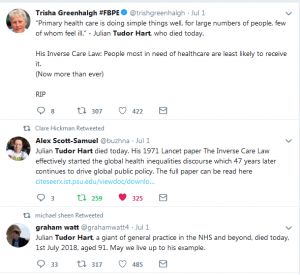In this blog post Graham Smith remembers the pioneering general practitioner Dr Julian Tudor Hart who died on the 1st of July. Graham interviewed him in June 1999.
Click HERE for a .mp3 audio extract from the interview and for a .pdf transcript of that extract: Tudor Hart in His Own Voice pt 1 extract 1
I still recall approaching the encounter with trepidation. My colleagues in the University of Glasgow’s Department of General Practice held Julian in great esteem and with much affection. The then head of unit  Professor Graham Watt rightly saw him as a significant figure in the history of general practice. I therefore wanted to get it right. A second challenge was that Julian was no fan of honours or building what he would have described as the cult of the individual. He had received an Honorary Doctorate from the University the day before, and as the interview reveals he had reluctantly agreed to the honorary degree because it could be used by the Department “a weapon” in our collective attempts to address health inequalities in Britain. He only agreed to be interviewed on the basis that we would discuss cult and myth making and the role of the individual in history.
Professor Graham Watt rightly saw him as a significant figure in the history of general practice. I therefore wanted to get it right. A second challenge was that Julian was no fan of honours or building what he would have described as the cult of the individual. He had received an Honorary Doctorate from the University the day before, and as the interview reveals he had reluctantly agreed to the honorary degree because it could be used by the Department “a weapon” in our collective attempts to address health inequalities in Britain. He only agreed to be interviewed on the basis that we would discuss cult and myth making and the role of the individual in history.
It was a shock to hear that Julian died at the weekend. It was a bigger surprise to realise he was aged 91. He had such remarkable presence and vigour.

Born in South Wales in 1927, Tudor Hart would later serve as a general practitioner in Glyncorrwg, West Glamorgan for three decades. He is perhaps best known for what he called, the “inverse care law”: that the availability of high quality social and medical care is likely to vary inversely with the needs of the populations served. It also echoed Marx’s slogan “From each according to their ability, to each according to their needs”.
A great deal of his writing (see below) and practice was influenced by time spent with Archie Cochrane’s Medical Research Council funded Epidemiology Unit. He was later the first honorary president of the  Socialist Health Association and throughout a champion of the National Health Service. However, he was always learning. And teaching. What I took from him is the importance of applying theory to practice.
Socialist Health Association and throughout a champion of the National Health Service. However, he was always learning. And teaching. What I took from him is the importance of applying theory to practice.
In 2006, Graham Watt nominated Julian for the Royal College of General Practitioner’s Discovery Award. In doing so Graham noted:
His ideas and example pervade modern general practice and remain at the cutting edge of thinking and practice concerning health improvement in primary care. …His life-long commitment to the daily tasks of general practice has always given his work and views a salience and credibility with fellow general practitioners. Julian Tudor Hart has been and will remain an inspiration to health practitioners and the communities they serve.
Oral histories are always co-productions. Their intersubjectivity, or “shared authority” as Michael Frisch put it, makes every interview unique. At the time of our encounter, Julian was at the top of his career. I was in a lowlier place as a Wellcome-funded history of medicine fellow embedded in a clinical department. However, Julian was kind enough to think seriously about my stuttering prompts and we had great fun. He asks his own questions too. At the end he says of the interview, “The whole bloody thing is a discussion between two left people with left politics… Two Marxists”. And then added, “I think that’s actually useful”. I continue to think that dialogue is useful. Many on the left and beyond will miss Julian’s contribution to public discourse.
Click HERE for a .mp3 audio extract from the interview and for a .pdf transcript of that extract: Tudor Hart in His Own Voice pt 1 extract 1
Graham Smith, 3 July 2018
Selected Tudor Hart bibliography
Articles
Hart, JT (1970). “Semi-continuous screening of a whole community for hypertension”. Lancet. 2: 223–6. doi:10.1016/s0140-6736(70)92582-1.
Hart, JT (1971). “The Inverse Care Law”. Lancet. 1: 405–12. doi:10.1016/s0140-6736(71)92410-x.
Hart, JT (1974). “Milroy Lecture: the marriage of primary care and epidemiology: continuous anticipatory care of whole populations in a state medical service”. Journal of the Royal College of Physicians of London. 8: 299–314.
Hart, JT (1982). “The Black Report: a challenge to politicians”. Lancet. 1: 35–7. doi:10.1016/s0140-6736(82)92569-7.
Hart, JT (1982). “Measurement of omission”. British Medical Journal. 284: 1686–9. doi:10.1136/bmj.284.6330.1686.
Watt, GCM; Foy, CJW; Hart, JT (1983). “Comparison of blood pressure, sodium intake, and other variables in offspring with and without a family history of high blood pressure”. Lancet. 1: 1245–8. doi:10.1016/s0140-6736(83)92697-1.
Hart, JT; Thomas, C; Gibbons, B; Edwards, C; Hart, M; Jones, J; Jones, M; Walton, P (1991). “Twenty-give years of audited screening in a socially deprived community”. British Medical Journal. 302: 1509–13.
Hart JT. “Two paths for medical practice. The Lancet 1992 sept 26; 340
Hart, JT (1992). “Rule of halves: implications of increasing diagnosis and reducing dropout for future workload and prescribing costs in primary care”. British Journal of General Practice. 42: 116–9.
Hart, JT (1995). “Clinical and economic consequences of patients as producers”. Journal of Public Health Medicine. 17: 383–6.
Hart, JT (1998). “Our feet set on a new path entirely: To the transformation of primary care and partnership with patients (Editorial)”. British Medical Journal. 317: 1–2. JSTOR 25179698.
Hart, JT (1998). “Thoughts from an old GP”. Lancet. 352: 51–2. doi:10.1016/s0140-6736(98)02430-1.
Hart JT. The National Health Service as precursor for future society. 2002
Books and chapters
Hart, JT. The National Health Service: in England and Wales. Communist Party of Great Britain; 1970.
Hart, JT and the Communist Party of Great Britain. The National Health Service in England and Wales: a Marxist perspective. London Health Students Branch. Research and Study Group, Marxists in Medicine; 1971.
Hart, JT. Going for Gold: a new approach to primary medical care in the South Wales valleys. Swansea: Socialist Health Association; 1997.
Hart, JT. Going to the doctor. In: Cooter R, Pickstone J (eds). Medicine in the 20th Century. Amsterdam: Harwood Academic Publishers; 2000. p. 543-58.
Hart, JT. Storming the Citadel: from romantic fiction to effective reality. In: Michael PF, Webster C (eds). Health and Society in Twentieth Century Wales. University of Wales Press; 2006. p. 208-15.

It is really close to my heart. Dr Julian Tudor Hart was a great person.
I have some of his books. it’s a pity he won’t write anything anymore